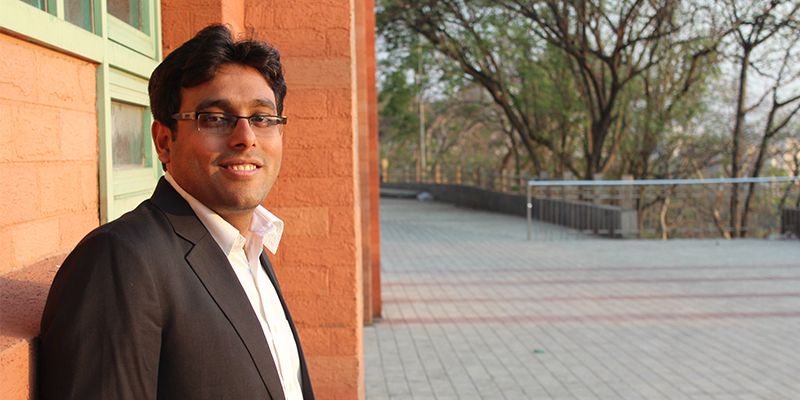Furniture and fixtures play a crucial role in the expansion of any retail business. Each time a retailer wants to expand to a new geography, they need to work with several contractors to build the entire set-up.
That’s where the operations team should watch out because costs can spiral out of hand when you work with multiple vendors. In retail, money in hand is money that can be given back in the form of shareholders’ return because it is a low-margin business. With this in mind, Amit Bansal, Amit Mishra, Puneet Bansal, and Vickramaditya Dhawal founded Rolling Banners in 2019. It is a one-stop shop for retailers to procure their furniture and fixtures for expanding operations without inadvertent delays.
“We provide a short-cut for brands to quickly launch new outlets by aggregating workshops that manufacture retail fixtures, furniture, and branding elements. From a brand’s perspective, we are responsible for setting up the outlet. We have been able to significantly improve the speed of building stores by way of element standardisation and process disruption. We are moving towards creating a one-stop platform for any offline retail brand in terms of business expansion starting from scouting retail properties to managing day-to-day retailing operations,” says Amit Bansal.
The concept

Amit Bansal, cofounder of Rolling Banners
“With so much of momentum going on in the home design and development space, the idea of Rolling Banners was quite obvious to the founding team as it is the best intersection of our experience and skill-set. We all used to have brainstorm sessions and it came up in one of those discussions. It immediately felt right and the experience of the team made it possible to validate the concept from several perspectives,” says Amit Mishra.
The team adopted an element-centric approach to retail development. The startup visualises a retail store as an assembly of independent elements coherently put together. They have divided the retail store into different elements, categories, and subcategories like branding, exterior signage carried with acrylic block letter type, a lit flex board or a solid letter ACP Board. The startup looks at fixture, digital and engagement tech, and civil work.
The company has technology that focusses on 10 plus categories, almost 100 plus sub-categories, and each subcategory has element types ranging from three to 45 items, which it helps clients in executing their work fast.
“While aggregating a workshop, along with many other assessments, one important thing we do is to map their capabilities to the element sub-category and element types,” says Amit Mishra.
On the client side, the startup signs up the brands on their retail development platform that they call R-Dash. As soon as a site is selected, a centralised design team resizes elements as per the store’s dimensions and updates it on the portal. The brand is notified at the same time. Once the brand approves it, the design specs and production guidelines are released to the best fit vendors which are selected automatically by the system against certain pre-defined criteria of cost, quality, and execution speed.
According to KPMG, the industry is huge as organised retailing in India is just 12 percent of the $1.1 trillion retail market.
Any brand, indigenous or foreign, expanding in India, finds it difficult to scale because the development value chain is broken at many levels and there is no national player to provide turnkey retail development solution. New technologies like AR, IOTs, smart check-out systems need an integrated player which makes this space even more interesting. While Livspace and Homelane are fairly successful in organising home development space (B2C), Rolling Banners is focussing on building solutions for the B2B retail industry.
The team
Amit Bansal and Puneet Bansal were flatmates while working in Noida in 2012. While Puneet worked as a facility designer, Amit Bansal worked as a structural designer. Amit Bansal and Amit Mishra were college buddies as they both pursued MBA from NITIE Mumbai with adjacent roll numbers. Amit Mishra and Vickramaditya were also college buddies from IIT-Roorkee. Vickramaditya was senior to Mishra but both of them came to know each other better while serving as member of central placement committee of IITR.
Their efforts on product and operations front are led by Puneet Bansal, who is a civil engineer from IIT-Delhi. Vickramaditya, a computer science grad from IIT-Roorkee, handles the tech stack, and holds three patents in technology architecture. Amit Mishra (Ex-Snapdeal, Reliance) is a mechanical engineer from IIT-Roorkee and manages the finance. He is currently doing the ground work with fintech companies to devise their vendor finance strategy. Amit Bansal leads the company and he is a civil engineer with structural design experience of high-rise towers in the UK/UAE along with some fashion retailing experience at Aditya Birla Group.

Puneet Bansal, cofounder of Rolling Banners
The business
The company is self-funded by the founders, who have invested Rs 30 lakh to build the tech.
“Managing working capital cash flow cycle was a challenge in the initial stages. As we were new in the market, vendors typically expected some advance payment to start our job. However, this challenge is slowly diminishing. As the company is earning credibility, and with business continuity, we are able to better manage the client payment collection and vendor pay-out cycles,” says Puneet Bansal.
Retail development has three stages: design, production, and installation. Traditionally, an individual vendor is responsible for managing all the three stages. India has 30,000+ workshops that manufacture branding elements. If you count in workshops producing furniture, chairs, fixtures, glass cutters, there are more than one lakh workshops in the country whose livelihood depends on $9 billion retail development market.
A typical workshop is driven by a single owner who is managing business development, design, production, installation, invoicing, and cash-flow management, all by himself. All this combined with his excessive dependence on one or two clients reduces the efficient utilisation of the workshop machinery and makes it difficult for him to expand his business.
“Rolling Banners is disrupting this service delivery value chain by dividing the overall responsibility into three above mentioned stages and making every stage efficient and frictionless with technology. Design is centralised and we are working on AI modelling technique to automate a major portion of it,” says Vickramaditya.
The workshop gets a clean production job that improves the return on capital deployed on machinery and labour for the workshop owner. Installation is done by a different set of semi-skilled workforce know as paster which is locally available in each geography. The revenue comes directly from the brands that are availing their technology and services.
The team started in 2019 by aggregating branding workshops and currently has 600 plus workshops in 100 plus cities with operational footprint in every corner of the country.
“We have also started aggregating retail furniture and fixture workshops recently. Most difficult part would be organising the civil work (like flooring, partitions, glasswork etc.) as a local project manager is to be deployed for quality control to deliver service in this category,” says Vickramaditya.
As of today, the startup claims about 15 MNC brands are actively using R-Dash platform for availing its retail development services. These include FedEx, DHL, Bridgestone, OYO, Wipro, Skechers, Baskin Robbins, and more. The startup is also helping one of the oldest US-based fabric companies, Glen Raven, in setting up its retail presence in India. The company closed FY-2020 with a revenue of Rs 8 crore.
“The company is now looking to raise $2 million in seed capital, which will help us grow to an annual revenue rate of $100 million in three years. The raised capital will be used to strengthen our tech stack, build deeper associations with our vendors, and create a pan-India retail development ecosystem by increasing our aggregated workshops from the current 600 to more than 10,000,” says Amit Bansal.
(Edited by Javed Gaihlot)
How has the coronavirus outbreak disrupted your life? And how are you dealing with it? Write to us or send us a video with subject line 'Coronavirus Disruption' to editorial@yourstory.com
YourStory RSS Feed - Link : https://yourstory.com/2020/05/retail-startup-rolling-banners-oyo-fedex
Author :- Vishal Krishna ( )
May 18, 2020 at 05:55AM
